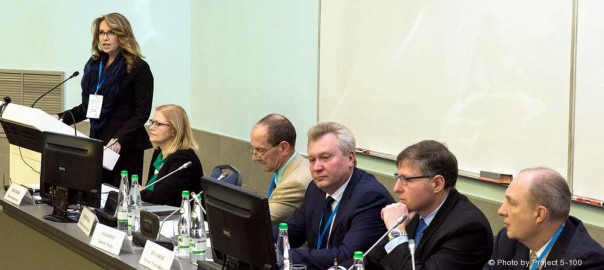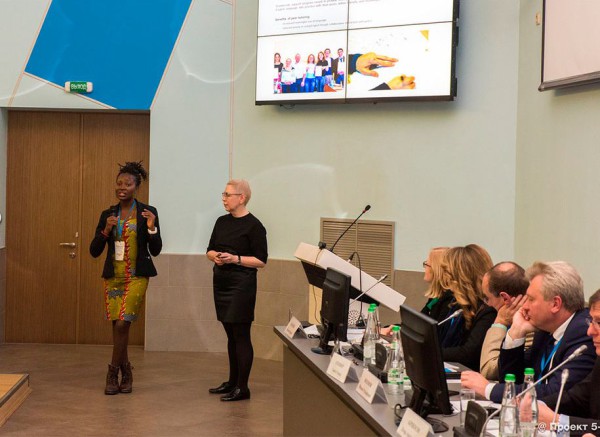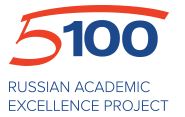November 24, 2015
How to build a world-class university was the main topic of the 14th seminar-conference of the Russian Academic Excellence Project. The seminar was held on 19-20 November at MISiS University.
To kick off the event, Alexander Povalko (Deputy Minister of Education and Science of Russia) addressed the attendees in the following way: “We have started these seminars for the sake of the universities that are not participating in the Project. We believe that what is discussed here, as well as what already has already been done over the past 3 years, is worth noticing”.
The Minister went on to add that this is the first time such distinguished guests have attended a Project seminar. During the plenary discussions on 19-20 November recommendations about how to build a world-class university were given by internationally acclaimed experts: Jamil Salmi, who was in charge of higher education matters in the World Bank for many years, Lindsay Greer (Head of materials science and metallurgy at Cambridge University) and Jan van Ruitenbeek (Professor at Leiden University).
Greer said that “A world-class university needs to have an international ‘science life’”. He stressed the importance of such factors as scientific research facilities, the existence of centers of excellence, participation in trans-national research projects, and decent housing for students and teachers. “There are no small issues in this matter”, Greer summed up.
Jan van Ruitenbeek offered that “A reputation of a university is like good wine, it must develop with time”. A university aspiring to become a leader outside its own country must decide in which direction its research will go. Professor van Ruitenbeek also said that not only the “stars”, but ordinary researchers and employees must publish in international science journals.
The second important topic was the development of key international academic rankings as well as the participation of Russian universities in these ratings. Members of the Times Higher Education (THE) team spoke to the attendees about the future plans for the ranking and provided a detailed comment on the results of Russian universities for certain indicators, then summed up the results of the new Physics Ranking where three Russian universities are listed: NRNU MEPhI (which rose from 95th place last year to 36 this year), MSU (59th) and NSU (86th). Representatives of the other two ratings of the “big three” – QS and ARWU – took part in a round table organized by the International expert group for ranking and qualifications IREG.
The presentation of the best practices of NUST MISiS was the main event of the second day of the seminar-conference. The university’s best initiatives were introduced by the Rector Alevtina Chernikova, Lindsay Greer and Jan van Ruitenbeek, world-renowned scientists and professors at MISiS Dmitry Goldberg and Igor Abrikosov, provosts Timothy O’Connor and Mikhail Filonov, head of the department of foreign languages and communication technologies Lilia Bondareva, and others.
Rector Chernikova noted the professional navigation program as one of the most successful initiatives of her university. The program covers school children of Moscow and Moscow Region and youth from the CIS and foreign countries. The implementation of this program at MISiS, like MISiS’s participation in the project “Time to Study in Russia”, has enabled the university to expand the geography of admissions, improve the quality of new students coming to the university, and actually increased the number of foreign admissions from 355 people per year in 2012 to 1256 people in 2013. Chernikova added that her university has also become known for its National Center for the Study of Russian as a Foreign Language.
Speaking of the university’s achievements, Mikhail Filonov (Provost for Science) noted that MISiS has managed to transform itself into a leader in the field of materials science in 2015 whereas in 2010 it was a narrowly-specialized institute of metallurgy. In 2015, four new labs opened, and the articles written by the university’s scientists started getting published in the world’s best journals, including “Nature”.
According to Igor Abrikosov (Supervisor of the Lab “Modeling and Development of New Materials” at MISiS and Head of Theory and Modeling at the University of Linköping (Sweden)), MISiS has become a unique venue where theorists, experimentalists and industrialists can find each other. Professor Abrikosov believes that conferences such as “Theory of Electronic Structure for Expedited Development of Structural Materials” — which was held at MISiS in October 2015 — “put MISiS on the map of global science” and changed the world’s perception of the Russian academic community”.
Elena Bazanova – Director of the Center for Academic Writing at MISiS – is certain that bad English damages the impression that any publication gives regardless of the quality of research it covers. Accordingly, the Center was set up in March 2015 to advise the scientists, organize lectures and feature seminars. In turn, in order to create a comfortable communication environment for students from 53 countries, the university is implementing a tutoring and intercultural communication program.
In addition to plenary sessions, the program of the seminar included round tables on participation in international fairs, scholarship programs and mega science projects, communication with the industry and recruitment of international students, creation of an attractive university image and improvement of the governance system, and many other topics. On 18 November, time was set aside for meetings of the working groups of the Global Universities Association. The 14th seminar-conference became the largest event of its kind for the Project: it was attended by representatives of 69 Russian universities including 21 Project universities – a total of 600 people.
Originally posted at http://5top100.ru/





